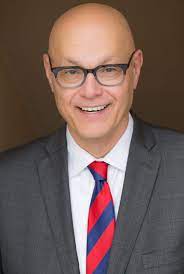Qwoted is committed to exploring the current state of the media by speaking to industry leaders and educating future generations of media professionals. What has social media and technological innovation brought to the table? What can we expect for the future of journalism?
Dan Shelley COO and ED of RDTNA wearing suit and smiling at the cameraDan Shelley is the Executive Director and Chief Operating Officer of the Radio Television Digital News Association and Foundation. His career began as a reporter turned news director at a small-market radio station in his Midwestern hometown. Working his way up through the industry, Dan’s resume includes working as an executive producer at a network-owned TV station in New York City, a general manager for a mid-sized radio station operator, and an SVP of digital at the largest diversified media company in the world. Throughout his career, Dan volunteered as a board member and chairman of RTDNA/RTDNF before accepting the role of Executive Director and COO in 2016. RTDNA is the world’s largest professional association devoted exclusively to advocating on behalf of broadcast and digital journalism. Its mission, along with its sister foundation, is to promote and protect responsible journalism while defending the First Amendment rights of electronic journalists across the U.S.
Dan’s advice to aspiring young writers and reporters? Journalism is not a profession, but a calling. Enter the field for the right reasons; to serve your community, to help find solutions to exposed issues, to empower and educate society, and so on.
Q: Which aspects of your work do you find the most challenging? The most rewarding?
DS: Without question, in today’s environment the most challenging aspect of my work is defending against the constant attacks on journalism and journalists, which in recent years have been exacerbated by an erosion of public discourse. Virtually every single day I must “proactively react” to threats to press freedom occurring somewhere in the United States. I also work hard to try to help the public understand that journalists, especially at the local level, are working directly for them and their communities, and that the stories they produce often serve as catalysts for positive change. While that is my biggest challenge, the result of that work is also often my greatest reward.
Q: The profession of journalism feels more attacked today than in a long time, but also highly necessary. Do you feel that’s true, and if so, why?
DS: The short answer is yes; journalism is both more attacked and more necessary than ever. On some level, though, one must put that in perspective. During the early days of our constitutional republic, it was not unheard of for the subjects of critical news stories to attack physically the “offending” journalists. Little-known fact: The man for whom the city of Denver is named once shot and killed a journalist for the “crime” of writing a news story exposing malfeasance at his place of business.
Q: What do you think about the role of technology in journalism? Is it helpful? harmful? Something in between?
DS: Technology is certainly helpful, but it can also — if journalism practitioners aren’t careful — be harmful. For example, advances in technology have given TV reporters the ability to report and shoot stories by themselves, sometimes referred to in our business as “one-man bands” or “one-woman bands.” Most TV news operations are very careful about how they implement this technology but a few, unfortunately, are not. That has led to an increasing number of harassment and assault cases targeting mostly young professional journalists who don’t have a photographer with them to help protect them in tense or dangerous situations. I say to journalists all across the country: Watch your backs, but don’t back down!
Q: Social media has upended the traditional media landscape. One of the great challenges it creates is authenticity and malevolent actors. How do think journalists and reporters should deal with the rising tide of misinformation?
DS: For journalists, social media can do an excellent job of amplifying their reporting and their ability to provide context and meaning. If journalists get too far ahead of their skis, however, and post something that reflects a personal opinion, controversial or not, their credibility and even their careers could be in jeopardy. I am also deeply troubled by the way social media is able to fuel the spread of disinformation (the intentional dissemination of false information) and misinformation (the unwitting spread of information that isn’t true). In some parts of the world, disinformation and misinformation, particularly centering around political campaigns, have had widespread and often dangerous consequences. In the United States, they have occasionally had the same unfortunate effect. Think “Pizzagate.”
Q: What are some of the best practices from journalism’s past that you feel need to be utilized now?
DS: The basic tenets of what I refer to as responsible journalism — especially the notion that reporting should be fair and honest — have been widely practiced for decades, and are even more relevant today than at any time in our nation’s modern history. But nowadays, journalists have a further responsibility not only to be fair and honest in their reporting, but to explain to their viewers, listeners and readers why they covered a particular story, how they covered it, the reasons they decided to do the story in the first place and their thought processes throughout. Transparency in journalism is critical to building and rebuilding the trust of the public.
Q: What gives you hope for the future of journalism?
DS: While in modern times there has never been a more challenging time for journalists’ credibility, there is also a tremendous opportunity to make tangible, positive differences in the communities and the nation it serves.
What are you hearing from students/RTDNA members about their ambitions and hopes for the profession?
DS: While I spend the bulk of my time helping our members and other professional journalists across the country, I often have the chance to interact with a top journalism school deans, faculty, and students. I am buoyed by what I like to call a renaissance of enthusiasm among students in becoming journalists. One outcome of our current ideological anti-media tropes is that they have sparked a renewed interest in journalism among many young people. Applications for enrollment at many of the nation’s best college and university journalism programs have increased dramatically during the past few years.



